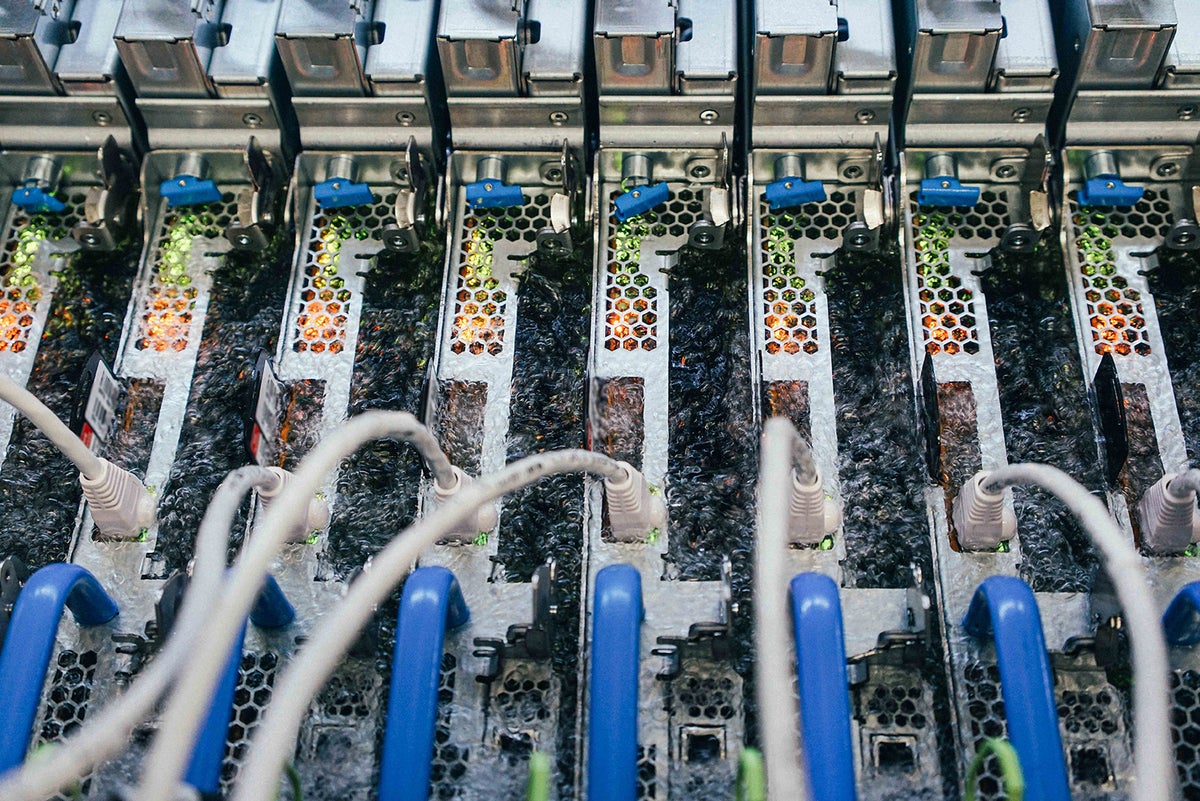- Apple doesn't need better AI as much as AI needs Apple to bring its A-game
- I tested a Pixel Tablet without any Google apps, and it's more private than even my iPad
- My search for the best MacBook docking station is over. This one can power it all
- This $500 Motorola proves you don't need to spend more on flagship phones
- Finally, budget wireless earbuds that I wouldn't mind putting my AirPods away for
Supermicro has a new liquid-cooled server for AI

With data center servers running hotter and hotter, the interest in liquid cooling is ramping up with vendors announcing servers that feature self-contained systems and businesses with expertise in related technologies jumping in.
Liquid cooling is more efficient than traditional air cooling, and Supermicro is using it to cool the hottest processors in a new server designed as a platform to develop and run AI software.
The SYS-751GE-TNRT-NV1 server runs hot. It features four NVIDIA A100 GPUs that draw 300W each and are liquid-cooled by a self-contained system.
Some liquid cooling systems rely on water that is piped into the data center. The self-contained system doesn’t require that, so it makes the servers more widely deployable.
The system is quiet, too; its running noise level is 30dB.
The SYS-751GE-TNRT-NV1 is an Nvidia-certified system that comes with a three-year subscription license for Nvidia’s AI Enterprise software stack that includes workflows, frameworks, pre-trained models, and infrastructure optimization and that can run on VMware vSphere.
The Supermicro SYS-751GE-TNRT-NV1 is available now.
Trane and Castrol show interest in liquid cooling
LiquidStack is trying to mainstream liquid-immersion data-center hardware and has found a partner and investor in HVAC leader Trane Technologies, which makes cooling systems.
Liquid stack says the investment will help it develop technology to significantly reduce data-center carbon footprint, water consumption, and e-waste.
LiquidStack says it will use the new funding primarily to ramp up manufacturing and open a new US facility to house research-and-development labs, factory-acceptance testing, and a service-training center.
The company claims its two-phase immersion cooling reduces data-center mechanical equipment energy use by up to 40% vs. air cooling, requires a 33% lower Capex, has a 32% lower TCO, and can reduce by 69% the space occupied by data-center IT and networking gear.
Trane will contribute its expertise with chillers, fluid coolers and heat-recovery systems as well as its system design, application engineering, and go-to-market team.
Meanwhile Castrol, known for making motor oil, is also getting involved in immersion cooling. It has joined the Infrastructure and Cloud Research and Test Environment (ICE) data-center unit of Research Institutes of Sweden with the goal of enhancing the technology.
The ICE data center in Luleå, Sweden, is a test bed for new IT technologies related to data centers, edge and cloud applications, IT architecture and machine learning. The collaboration with Castrol aims to improve understanding of the benefits that come from immersion technology.
Castrol has a continuing interest in the technology. Last October, it announced plans to build an immersion-cooling development-and-test facility for data centers at its global headquarters in Pangbourne, England. Castrol’s thermal management experts will work there to develop advanced immersion fluid technologies specifically for data centers and IT/communications infrastructure. The facility will also support test and validation programs for customers and partners.
The company already collaborates with Submer, an immersion-cooling startup. Castrol plans to use Submer’s SmartPod and MicroPod tank systems to test new fluids it has developed as well as new server equipment.
Copyright © 2023 IDG Communications, Inc.

